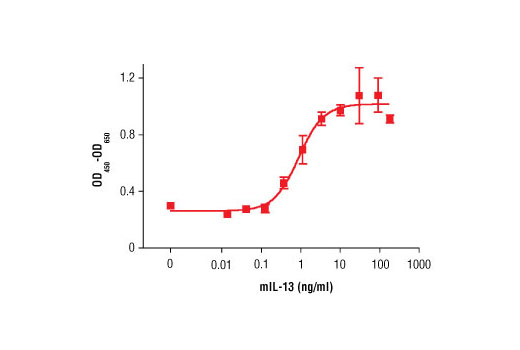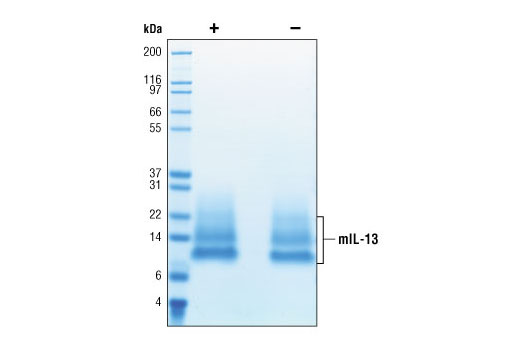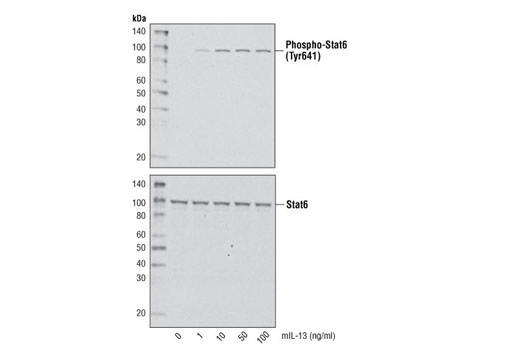12-20
#P20109
16163
Background
IL-13 is produced by T cells and is important in the TH2 response. IL-13 targets include B cells, eosinophils, fibroblasts, mast cells and macrophages (1-3). IL-13 binds specifically to IL-13Rα1 that complexes with IL-4Rα to form the Type II IL-4R. Jak1 and Tyk2 are activated and signal through Stat3 and Stat6 (4). IL-13Rα2 is a different gene product, lacks the intracellular domain, does not complex with IL-4Rα and does not signal (1,4,5). The extracellular domain of IL-13Rα2 is often elevated in diseased states. IL-13 plays key roles in airway hyperresponsiveness (AHR) of allergic asthma (1,6,7) and modulates resistance to parasitic organisms (1).
- Wynn, T.A. (2003) Annu Rev Immunol 21, 425-56.
- Katz, Y. et al. (1995) Clin Exp Immunol 101, 150-6.
- McKenzie, A.N. et al. (1993) Proc Natl Acad Sci USA 90, 3735-9.
- Wills-Karp, M. and Finkelman, F.D. (2008) Sci Signal 1, pe55.
- Mentink-Kane, M.M. et al. (2004) Proc Natl Acad Sci U S A 101, 586-90.
- Wills-Karp, M. et al. (1998) Science 282, 2258-61.
- Nakajima, H. and Takatsu, K. (2007) Int Arch Allergy Immunol 142, 265-73.
Endotoxin
Less than 0.01 ng endotoxin/1μg mIL-13.
Purity
>98% as determined by SDS-PAGE of 6 μg reduced (+) and non-reduced (-) recombinant mIL-13. All lots are greater than 98% pure.
Source / Purification
Recombinant mouse IL-13 (mIL-13) Ser26-Phe131 (Accession #NP_032381) was expressed in human 293 cells at Cell Signaling Technology.
Bioactivity
The bioactivity of recombinant mIL-13 was determined in a B9 cell proliferation assay. The ED50 of each lot is between 0.5 - 20 ng/ml.
Background
IL-13 is produced by T cells and is important in the TH2 response. IL-13 targets include B cells, eosinophils, fibroblasts, mast cells and macrophages (1-3). IL-13 binds specifically to IL-13Rα1 that complexes with IL-4Rα to form the Type II IL-4R. Jak1 and Tyk2 are activated and signal through Stat3 and Stat6 (4). IL-13Rα2 is a different gene product, lacks the intracellular domain, does not complex with IL-4Rα and does not signal (1,4,5). The extracellular domain of IL-13Rα2 is often elevated in diseased states. IL-13 plays key roles in airway hyperresponsiveness (AHR) of allergic asthma (1,6,7) and modulates resistance to parasitic organisms (1).
Background References
Cross-Reactivity Key
H: human M: mouse R: rat Hm: hamster Mk: monkey Vir: virus Mi: mink C: chicken Dm: D. melanogaster X: Xenopus Z: zebrafish B: bovine Dg: dog Pg: pig Sc: S. cerevisiae Ce: C. elegans Hr: horse GP: Guinea Pig Rab: rabbit All: all species expected
Trademarks and Patents
Limited Uses
Except as otherwise expressly agreed in a writing signed by a legally authorized representative of CST, the following terms apply to Products provided by CST, its affiliates or its distributors. Any Customer's terms and conditions that are in addition to, or different from, those contained herein, unless separately accepted in writing by a legally authorized representative of CST, are rejected and are of no force or effect.
Products are labeled with For Research Use Only or a similar labeling statement and have not been approved, cleared, or licensed by the FDA or other regulatory foreign or domestic entity, for any purpose. Customer shall not use any Product for any diagnostic or therapeutic purpose, or otherwise in any manner that conflicts with its labeling statement. Products sold or licensed by CST are provided for Customer as the end-user and solely for research and development uses. Any use of Product for diagnostic, prophylactic or therapeutic purposes, or any purchase of Product for resale (alone or as a component) or other commercial purpose, requires a separate license from CST. Customer shall (a) not sell, license, loan, donate or otherwise transfer or make available any Product to any third party, whether alone or in combination with other materials, or use the Products to manufacture any commercial products, (b) not copy, modify, reverse engineer, decompile, disassemble or otherwise attempt to discover the underlying structure or technology of the Products, or use the Products for the purpose of developing any products or services that would compete with CST products or services, (c) not alter or remove from the Products any trademarks, trade names, logos, patent or copyright notices or markings, (d) use the Products solely in accordance with CST Product Terms of Sale and any applicable documentation, and (e) comply with any license, terms of service or similar agreement with respect to any third party products or services used by Customer in connection with the Products.


